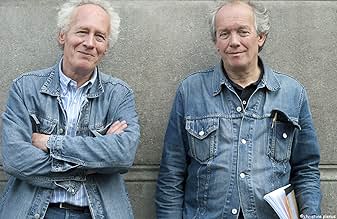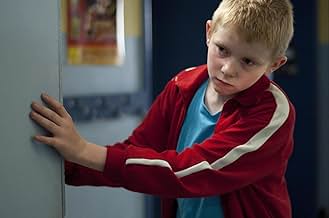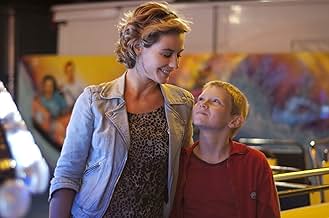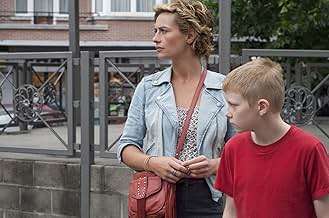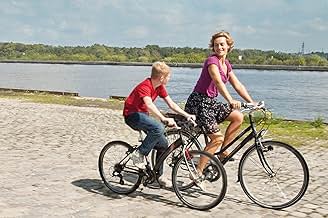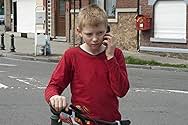IMDb RATING
7.4/10
29K
YOUR RATING
Abandoned by his father, a young boy is left in a state-run youth farm. In a random act of kindness, the town hairdresser agrees to foster him on weekends.Abandoned by his father, a young boy is left in a state-run youth farm. In a random act of kindness, the town hairdresser agrees to foster him on weekends.Abandoned by his father, a young boy is left in a state-run youth farm. In a random act of kindness, the town hairdresser agrees to foster him on weekends.
- Directors
- Writers
- Stars
- Awards
- 9 wins & 31 nominations total
Cécile de France
- Samantha
- (as Cécile De France)
Samuel De Ryck
- Éducateur 2
- (as Samuel De Rijk)
- Directors
- Writers
- All cast & crew
- Production, box office & more at IMDbPro
Featured reviews
A beautiful film. One that pulls you in by the honest and genuine storytelling told in the Dardenne brothers' trademark naturalistic and guileless tone that is refreshing and sorely missed in today's too often rambunctious style of movies.
The story is simple and organic, the kid initially breaking out of foster care to find his father, and his bike both of which give him some identity and purpose in the world. He befriends several characters along the way (and in the Dardennes films, the characters are few, but all play vital roles) including the benevolent Samantha (whom I thought was very sweet but perhaps too pretty - and talented - to play a working- class hairdresser). Some characters are good (Samantha), some not so (Wes) and some have their own agendas to make a living.
In this way, the film is not unlike (and I quote the Dardennes) a fairytale - the boy (hero) on quest in the wide world which various characters and dangers lurking, yet set in this ultra realistic (read social-realist) setting.
The style of film-making here is pure and simple in that social-realist style, simply presenting characters who live on the fringe of society; who live in poor social economic conditions or don't have the opportunity of good schooling or the genuine love of a mother or father. As a result it is perhaps a little easier to understand why Cyril acts the way he does, rebelling against society, trying to find his place in the world. As you watch perhaps keep in mind what you might do to make ends meet.
The kid is astounding in a first-time performance, he conveys so much frustration, anger, pathos, regret with just glances and looks, most of the screen time without dialogue. Just watch the sequences when he is cycling on his bike, utterly free, chasing (or escaping) his life as the master of his own destiny.
This is a very simple & heartfelt tale, it tells the story as it is with no artifice, shot in the gorgeous dappled sunlight of a Belgian summer. It is not as hard-hitting and gritty as other of the Dardennes' films, such as emotional sledgehammers like Rosetta, Le Fils & L'Infant, but, it is still very good.
The story is simple and organic, the kid initially breaking out of foster care to find his father, and his bike both of which give him some identity and purpose in the world. He befriends several characters along the way (and in the Dardennes films, the characters are few, but all play vital roles) including the benevolent Samantha (whom I thought was very sweet but perhaps too pretty - and talented - to play a working- class hairdresser). Some characters are good (Samantha), some not so (Wes) and some have their own agendas to make a living.
In this way, the film is not unlike (and I quote the Dardennes) a fairytale - the boy (hero) on quest in the wide world which various characters and dangers lurking, yet set in this ultra realistic (read social-realist) setting.
The style of film-making here is pure and simple in that social-realist style, simply presenting characters who live on the fringe of society; who live in poor social economic conditions or don't have the opportunity of good schooling or the genuine love of a mother or father. As a result it is perhaps a little easier to understand why Cyril acts the way he does, rebelling against society, trying to find his place in the world. As you watch perhaps keep in mind what you might do to make ends meet.
The kid is astounding in a first-time performance, he conveys so much frustration, anger, pathos, regret with just glances and looks, most of the screen time without dialogue. Just watch the sequences when he is cycling on his bike, utterly free, chasing (or escaping) his life as the master of his own destiny.
This is a very simple & heartfelt tale, it tells the story as it is with no artifice, shot in the gorgeous dappled sunlight of a Belgian summer. It is not as hard-hitting and gritty as other of the Dardennes' films, such as emotional sledgehammers like Rosetta, Le Fils & L'Infant, but, it is still very good.
Cyril, a young boy of about 12, is abandoned by his deadbeat father in the care of some sort of group home. He obsessively tries to reunite with his father, and in the process, falls into the hands of a surrogate mother... and a rather shady surrogate father. The Dardennes aren't straying much from their established style, but there's no reason to. Again, we have a highly effective look at people in emotional crisis and in the grips of moral dilemmas. Throughout the film you're questioning your reactions to things (boy, that Cyril seems like an awful little monster at first) or asking "What would I do?" Again, the camera-work is immediate and unfettered by stylistic flourishes, putting you right inside the lives of these characters. Again, the performances are so natural they feel almost documentary. While I don't think Thomas Doret is as powerful a young actor as Emilie Dequenne in ROSETTA or other Dardenne leads, he does win you over after an unsympathetic start. The movie deals with several parallel themes, the most prominent being one of finding love and acceptance where you can, but it doesn't simply hammer on that one and leaves room for other avenues. I'm not sure yet if I would put this among the best of the Dardennes, but it made a strong first impression.
"Not everyone can be an orphan." Andre Gide
A kid with only a bike and no mother or active father---now that's a setup for sentiment. Yet the Dardenne brothers have fashioned an unsentimental, realistic drama, The Kid with a Bike, about an 11 year old boy, Cyril (Thomas Doret), who is fortunately taken in by a guardian, town hairdresser Samantha (Cecile De France), but not without serious setbacks that are understandable given his unstable background.
The title evokes thoughts of the famous Italian neo-realist Bicycle Thief, in which a young boy is introduced to life's hard knocks through an imperfect father. In Kid, the father is a deadbeat deserter whose brief appearances are depressing because it's clear a reconnection with his son is not going to happen.
Cyril is running through most of the film, either by bike or foot, a motif signifying his desperate desire for a parent. However blood does not have to be in the loving equation as Samantha becomes a willing surrogate.
No surprise The Boy with the Bike won the Grand Jury Prize at Cannes (2011) and the directors several times before in multiple categories. The humanity rather than the technicality dominates the emotionality; the two principal actors, Doret and De France, are incomparably natural and convincing. Make no mistake, this is a film about a boy, whose character arc the directors fully present. Whether or not he ends up for good through all the turmoil is the pleasure of watching this soon-to-be classic.
You may think again about leaving your child with only his bicycle.
A kid with only a bike and no mother or active father---now that's a setup for sentiment. Yet the Dardenne brothers have fashioned an unsentimental, realistic drama, The Kid with a Bike, about an 11 year old boy, Cyril (Thomas Doret), who is fortunately taken in by a guardian, town hairdresser Samantha (Cecile De France), but not without serious setbacks that are understandable given his unstable background.
The title evokes thoughts of the famous Italian neo-realist Bicycle Thief, in which a young boy is introduced to life's hard knocks through an imperfect father. In Kid, the father is a deadbeat deserter whose brief appearances are depressing because it's clear a reconnection with his son is not going to happen.
Cyril is running through most of the film, either by bike or foot, a motif signifying his desperate desire for a parent. However blood does not have to be in the loving equation as Samantha becomes a willing surrogate.
No surprise The Boy with the Bike won the Grand Jury Prize at Cannes (2011) and the directors several times before in multiple categories. The humanity rather than the technicality dominates the emotionality; the two principal actors, Doret and De France, are incomparably natural and convincing. Make no mistake, this is a film about a boy, whose character arc the directors fully present. Whether or not he ends up for good through all the turmoil is the pleasure of watching this soon-to-be classic.
You may think again about leaving your child with only his bicycle.
The Kid with a Bike (2011)
A troubled boy finds an informal foster mom who tries her best to keep in line. That's the story and in way that's the whole depth of the story. The details—his rebellion, his responding to love, his being suckered by a drug dealer—are expected and interesting and beautifully told. The story has a slightly polished realism to separate it from its forebear, the great classic "The Bicycle Thief," and there might be a slight gap in motivations to explain, but in general you get sucked into this situation and the awkward relationship between the two. It is a tale appreciated in its siimple telling.
I had a foster child for a couple of years at an age close to this boy's, and there is a lot here that makes vivid sense. The woman, perhaps too lovely for normal realism (played by Cecile De France), is nevertheless sincere and quite smart in her mothering skills. She gets the boy to live with her almost by chance, and follows that chance, and learns to give him some rope and to also reign him in by example and through compassion.
But even this isn't enough. That's one of the terrifying truths of being a foster parent (or any parent)—you can only do your best. Some of the result is a product of luck, or personality, or some course of outside events that you don't predict (even if later you can say you saw them coming). All of this is included here, well done, with a kind of filmic modesty.
The one bit of high drama comes down to the child pushing his limits when he gets into a criminal plan, and the results of that, which leads to a bit of small time revenge that goes wrong. The boy is now beyond his own limits and is literally stunned. By the last scene, you ought to be heartbroken but also really hopeful. The message finally is that kids are really resilient, and you have to keep opening the right doors for them and let them make good choices.
This film lets us do that.
A troubled boy finds an informal foster mom who tries her best to keep in line. That's the story and in way that's the whole depth of the story. The details—his rebellion, his responding to love, his being suckered by a drug dealer—are expected and interesting and beautifully told. The story has a slightly polished realism to separate it from its forebear, the great classic "The Bicycle Thief," and there might be a slight gap in motivations to explain, but in general you get sucked into this situation and the awkward relationship between the two. It is a tale appreciated in its siimple telling.
I had a foster child for a couple of years at an age close to this boy's, and there is a lot here that makes vivid sense. The woman, perhaps too lovely for normal realism (played by Cecile De France), is nevertheless sincere and quite smart in her mothering skills. She gets the boy to live with her almost by chance, and follows that chance, and learns to give him some rope and to also reign him in by example and through compassion.
But even this isn't enough. That's one of the terrifying truths of being a foster parent (or any parent)—you can only do your best. Some of the result is a product of luck, or personality, or some course of outside events that you don't predict (even if later you can say you saw them coming). All of this is included here, well done, with a kind of filmic modesty.
The one bit of high drama comes down to the child pushing his limits when he gets into a criminal plan, and the results of that, which leads to a bit of small time revenge that goes wrong. The boy is now beyond his own limits and is literally stunned. By the last scene, you ought to be heartbroken but also really hopeful. The message finally is that kids are really resilient, and you have to keep opening the right doors for them and let them make good choices.
This film lets us do that.
This film takes place in Europe (Belgium, apparently) so it has far less of the violence that would accompany the same story set in America. But otherwise the story is particularly painful to watch because the essential elements - a kid without a father, his self-hate and anger, the substitute father figures laying in wait - are directly relevant to the American context. In a lean, tough story, the film takes us through a broad tour of the issues and risks and even reasons for hope in these situations. Young Thomas Doret fiercely embodies the aching and the rage of a boy who wants a father at any price and is a near-force of nature in trying to obtain what should be his by right. Cécile De France's Samantha has numerous real-life counter-parts, credited by more than one survivor of these dilemmas, but not always successful in their roles as passionate rescuers. How this particular story turns out is not so important as the realization that all across the world children live in Cyril's situation; some make it, many don't.
Did you know
- TriviaFor both the moments where Cyril is running from the police and ends up in the doctor's office and the opening scene when he's using the phone and won't let go, the young actor was just instructed by the directors not to give up what the character was doing under any circumstance.
- GoofsWhen the hairdresser is leaving the orphanage after she returned Cyrill's bike the car she is driving makes the sound of Diesel engine, but in the next scene with the same car the car sounds like it has a petrol engine.
- Quotes
Guy Catoul: It's too much. I can't look after him.
- ConnectionsFeatured in At the Movies: Cannes Film Festival 2011 (2011)
- SoundtracksAdagio un poco mosso
from Piano Concerto No. 5, Op. 73
written by Ludwig van Beethoven
performed by Alfred Brendel and the London Philharmonic Orchestra
conducted by Bernard Haitink
- How long is The Kid with a Bike?Powered by Alexa
Details
- Release date
- Countries of origin
- Official sites
- Language
- Also known as
- The Kid with a Bike
- Filming locations
- Production companies
- See more company credits at IMDbPro
Box office
- Gross US & Canada
- $1,470,000
- Opening weekend US & Canada
- $45,933
- Mar 18, 2012
- Gross worldwide
- $7,182,147
- Runtime1 hour 27 minutes
- Color
- Sound mix
- Aspect ratio
- 1.85 : 1
Contribute to this page
Suggest an edit or add missing content


